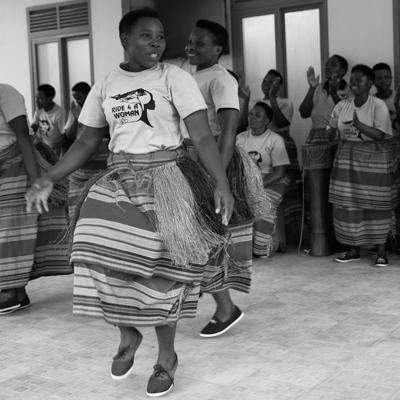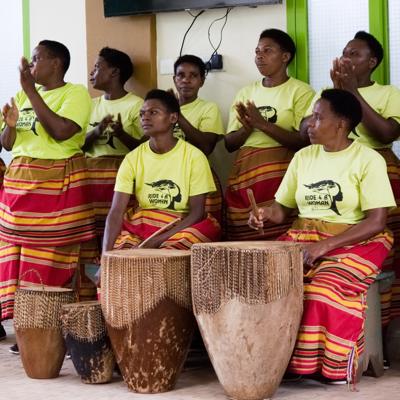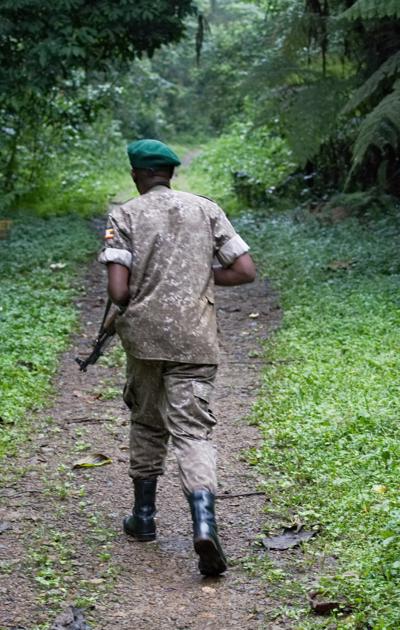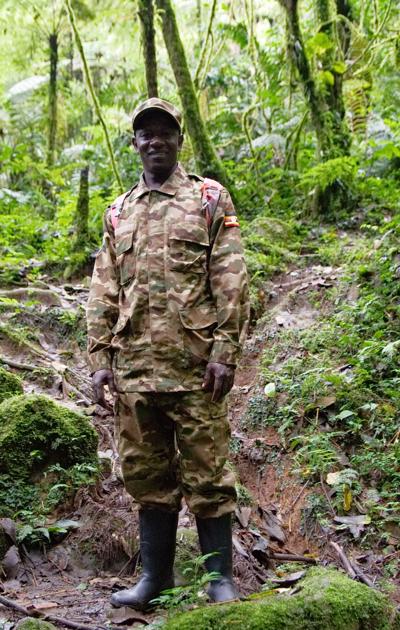Our life Untethered
Due to having a head cold and the cost involved in going on a gorilla trek, I sadly decided to cancel. Tourists are supposed to let the guides know if they are feeling sick, so they can ensure that that gorilla families stay healthy. So instead of going on a trek to see gorillas I went on a forest walk instead.
The forest walk involved going to see a number of waterfalls which fed the main local river that supplies Bwindi and other nearby provinces around with fresh water. The walk that was planned has us go quite deep inside Bwindi forest that holds many species including forest Elephants and Chimpanzees. Due to the danger from wild forest Elephants, they are isolated creatures that can get violent towards people if they encroach on their land, I had a guide and two armed guards with me. There is a real concern within the national park guides and the ecotourism community that an injury or death of a tourist would have a serious impact on overall tourism into the country, so the park wardens take tourist safety very seriously.
Carolyn BAGUMA
16 chapters
15 Apr 2020
Chapter 9 - Bwindi Forest Walk
Bwindi National Park Uganda
Due to having a head cold and the cost involved in going on a gorilla trek, I sadly decided to cancel. Tourists are supposed to let the guides know if they are feeling sick, so they can ensure that that gorilla families stay healthy. So instead of going on a trek to see gorillas I went on a forest walk instead.
The forest walk involved going to see a number of waterfalls which fed the main local river that supplies Bwindi and other nearby provinces around with fresh water. The walk that was planned has us go quite deep inside Bwindi forest that holds many species including forest Elephants and Chimpanzees. Due to the danger from wild forest Elephants, they are isolated creatures that can get violent towards people if they encroach on their land, I had a guide and two armed guards with me. There is a real concern within the national park guides and the ecotourism community that an injury or death of a tourist would have a serious impact on overall tourism into the country, so the park wardens take tourist safety very seriously.


My main guide was Robert, he walked me through each part of the forest detailing different species and areas of the forest, as well as talking about the various plant species. Sadly, we didn’t see any monkey species this time, but there are Chimpanzees, Black and White Colobus monkeys in the area. We had a long conversation about how our one of our local friends thought they should habituate a few groups of Chimpanzee in the area so that tourists could more easily see these wonderful animals. However, many conservationists are opposed to habituation of animals as it affects their behaviour, and they can be put at risk by hunting. However, the counter argument to that is that Bwindi is suffering from so much abject poverty that they are reliant on tourism and the expansion on tourism to provide jobs and money that can be spent on local utilities, roads etc.
This is an age-old debate in conservation and ecotourism, how do we balance animal welfare, conservation with increased tourism and the


demands of local populations that need food, jobs, housing etc. To demand that entire areas of land are protected and off limits to local populations that are very poor and not giving them, another means to survive is very unlikely to work. Pressures will soon grow on the national park boundaries and incursions into the land to hunt, graze and collect wood is likely to grow. With initiatives to create employment, improve local utilities and help with the chronic social issues largely caused by HIV and poverty the local population is more likely to respect and love the National parks rather than resent their presence. Tourism in these regions must give back for it to work, and for habitats to survive. Its very easy to sit in a western country and stipulate that countries must do more to protect their wildlife, but we must understand the socio-political issues on the ground before condemning countries for not doing enough.
Robert had very clearly laid out his argument that habitation of primates should not happen in the park as it there were other parks nearby that tourists went to see Chimpanzees. Bwindi national park is famous for Gorillas, and many tourist flock there to see them. In not habituating more animals in the area they were ensuring that tourists tour to other regions of Uganda to see those animals as well making sure that tourist money is spent in different regions across Uganda. I am sure this debate could go on for some time with detailed arguments for and against, but I understood his point and largely agreed with the decision of the National Park Authorities in Uganda.
I love forests and am always happy when walking through different habitats. The vegetation was lush, it was very hot and humid, but nothing compared to the swamp forest of Sumatra, it was relatively comfortable for a tropical country. Robert told me that many of the original old mahogany trees in the park had been cleared many years ago so many of the trees were relatively young and the forest was re-establishing itself, however illegal logging had largely been wiped out and was no longer an issue in the park. After walking for almost two hours we arrived at the final waterfall, it was roughly 50m high and very beautiful, and cool. The breeze and water spray off the waterfall meant that the atmosphere was very cool and fresh. I had run out of water at that point, so collected some more from the river. My guide was surprised by this, but I ensured him that my filter bottle would make the water safe for me to drink! He was very interested in the bottle as he said he would have to boil the water to not get sick, but once I told him the price in Uganda shillings, he looked at me with a startled look on his face and whistled. There are many people across Uganda that have an average salary of around 100, 000 Uganda shillings a month which is roughly £20, I just realized that my water bottle was likely to be two months salary for my guide, I decided to keep such facts to myself in future and just say it was very expensive!
I enjoyed the view of the waterfall for a little while and sat and rested up drinking and eating some bananas before we started to move off once more. By that point my guide was a little more relaxed knowing that I was comfortable on the terrain, so he didn’t have to help to guide me around wet or boggy areas, so we just walked and chatted. We spoke about his football team, the Gorillas, I had already met a guide at Lake Mburo, their team was called the Zebras. We spoke about how the football games between the teams helped the moral and team bonding between the parks, who used to rarely talk with each other. He also spoke about how they needed boots and other equipment as some players were playing barefoot. I said that I would try to see if I could get some boots to him, or at least donate some money to the team for equipment, so we spoke about taking each other’s details and staying in touch.
I was loving being deep in the forest, but I soon realized that the park was starting to thin out and, I was once again approaching the park entrance. Sadly, I had no money on me at all, in fact we barely had enough to pay for the hotel and the only local cash machine was empty. Cash had been something we hadn’t thought about too much on our tour as the tour provider had pre-paid most of the hotels and events that we had done. Having to tell a local guide you didn’t even have 1000 shillings (about 20 pence!) for a tip is a little demoralizing for a group of guys working hard to protect the park. So, I will try my best to help them with football equipment on my return to the UK. I sadly didn’t see much in the way of wildlife as most of the species were hiding away from us, but I did have an amazing time walking through a beautiful forest in the mountains of Uganda close to the Congo border.
1.
Chapter 1 - The long journey
2.
Chapter 2 - Power of a smile
3.
Chapter 3 - The Boda Way
4.
Chapter 4- The Rain
5.
Chapter 5 - On the road to Mburo
6.
Chapter 6 - Lake Mburo Safari Walk
7.
Chapter 7 - Leaving Lake Bunyoni
8.
Chapter 8 - Wildlife of Uganda
9.
Chapter 9 - Bwindi Forest Walk
10.
Chapter 10 - Journey to Fort Portal
11.
Chapter 11 - Trying to reduce plastic
12.
Chapter 12 - Road to Nairobi
13.
Chapter 13 - A few nights in Nairobi
14.
Chapter 14 - Working at Yaapha
15.
Chapter 15 - Trumper
16.
Chapter 16 - Oasis in Arusha
Share your travel adventures like this!
Create your own travel blog in one step
Share with friends and family to follow your journey
Easy set up, no technical knowledge needed and unlimited storage!
© 2025 Travel Diaries. All rights reserved.